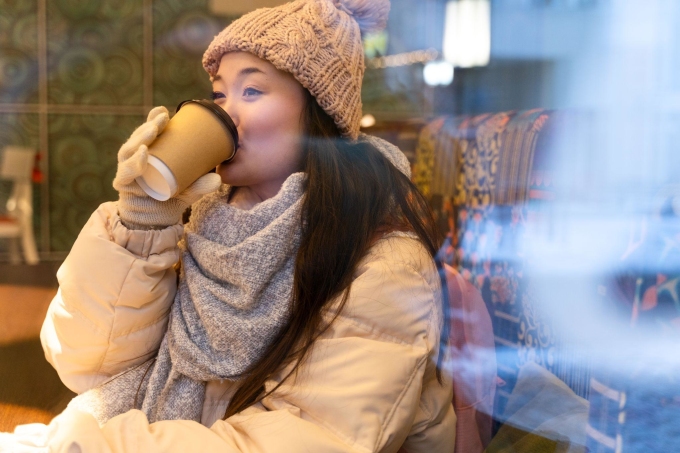Keeping your body warm, drinking warm water, exercising, and getting enough sleep can boost your health and reduce the risk of respiratory illnesses when temperatures drop suddenly.
Northern Vietnam is transitioning between winter and spring. The cold, humid weather creates favorable conditions for the growth of viruses, bacteria, and mold that cause disease. These can easily enter the body through the respiratory tract when inhaled.
Dr. Tran Duy Hung, from the Respiratory Department of Tam Anh General Hospital in Hanoi, said that the increased demand for trade, tourism , and festivals leading up to the Lunar New Year increases the risk of spreading influenza, measles, rubella, and Covid-19... Young children, the elderly, those with underlying diseases or weakened immune systems (HIV/AIDS, prolonged corticosteroid use), and those with weak resistance are more susceptible to these illnesses.
Patients with chronic conditions such as asthma, chronic obstructive pulmonary disease (COPD), influenza, the common cold, rhinitis, pharyngitis, bronchitis, pneumonia, etc., are prone to recurrent acute episodes and severe illness.
Doctor Hung suggests ways to prevent respiratory infections when temperatures drop.
Keep your body warm.
Cold weather causes blood vessels under the skin to constrict, restricting blood flow, and dries out the protective mucous layer of the respiratory tract lining, reducing immunity. This creates an opportunity for viruses, bacteria, and fungi to easily invade the nose and mouth and cause illness.
Everyone should keep their nose, neck, and chest warm by wearing turtlenecks or scarves. Avoid dressing too lightly in cold weather, even indoors. Wear several layers of thin clothing instead of thick clothes to reduce discomfort and prevent drafts. Parents should wipe away sweat from children to prevent it from soaking back into their bodies. Use heaters or fireplaces to warm the air indoors. Absolutely do not burn wood or charcoal in enclosed spaces to prevent suffocation.
Keep your feet warm by wearing socks, thick-soled shoes, and insoles. Soak your feet in warm water mixed with herbs like ginger, tea tree oil, peppermint, or a little salt for about 10-15 minutes before bed to dilate blood vessels in the feet, promote blood circulation, warm the body, and help you sleep better.
The water temperature should be around 40-50 degrees Celsius; avoid using water that is too hot. Avoid soaking your feet within 30 minutes after a meal so that your body can focus on digesting food effectively. Women during menstruation and people with cardiovascular disease should not soak their feet.
Drink warm water.
Dehydration causes the protective mucous membrane lining the respiratory tract to dry out, affecting breathing. Drinking enough water improves blood circulation, reduces irritation and dryness in the throat, and thins mucus. Drinking warm water and inhaling warm steam can help clear the airways. Conversely, using cold water can easily cause the respiratory tract lining to constrict or swell, become congested, and make it easier for viruses and bacteria to attack and cause illness.
Dr. Hung recommends that adults drink about 2-3 liters of water per day, divided into several servings. Prioritize filtered water, fruit juices, vegetable soups, or herbal teas such as ginger tea or honey-lemongrass tea. Minimize alcohol and coffee consumption.

Drinking warm water and inhaling warm steam is good for the respiratory system when the weather turns cold. Photo: Freepik
Do exercise
Exercising for about 20-30 minutes each day helps keep the body flexible, improves blood circulation, and strengthens the immune system. Physical activity contributes to maintaining a healthy weight, reducing the risk of obesity, sleep apnea syndrome, and more.
Some outdoor activities that are good for your health include walking, jogging, cycling, swimming, playing soccer, badminton, etc. If the weather is cold and you can't go outside, you can substitute it with yoga, gym workouts, or table tennis.
Increase your intake of green vegetables.
A healthy, balanced diet helps improve physical condition and reduce the risk of disease. End-of-year menus are diverse, but not all foods are nutritious and good for health.
Prioritize eating fresh fruits and vegetables rich in vitamin C to help protect the body against damage from free radicals, toxic chemicals, and pollutants, reducing the risk of respiratory infections. Some fruits and vegetables to consider include peppers, kale, broccoli, guava, citrus fruits, and kiwi.
Vegetables and fruits rich in vitamin A, such as sweet potatoes, carrots, tomatoes, and papaya, support the regeneration of respiratory tract epithelium and reduce the risk of infection. Grains, seafood, eggs, and beans, rich in protein, contribute to strengthening the body's defenses.
To ensure overall health, people should limit their consumption of sugary foods such as cakes, candies, Tet jams, processed foods, or foods that are fried in a lot of oil and fat, and animal organs.
Get enough sleep.
Sleep deprivation weakens the immune system and increases inflammation in the body. A study by the University of California, USA, and several other institutions, published in the PubMed medical library in 2015, on 164 healthy men and women (aged 18 to 55) showed that those who slept less than 5 hours per night had a 4.5 times higher risk of catching a cold compared to those who slept more than 7 hours. Those who slept 5-6 hours per night had a 4.2 times higher risk. For optimal immune system function, adults need 7 hours or more of sleep per night.
Maintain hygiene
According to Dr. Hung, during the transition period between winter and spring, in the northern provinces, the days are short and the nights are long, resulting in fewer hours of sunlight per day. This reduces the opportunity for ultraviolet rays to kill harmful microorganisms in the environment. The cold weather causes people to stay indoors more, closing doors and windows to prevent cold air from entering. Poor indoor air circulation creates favorable conditions for allergens to persist, increasing the chance of them entering the body and causing illness.
To avoid getting sick during Tet (Lunar New Year), everyone needs to maintain personal hygiene and keep their living space clean. Wipe and vacuum the house; regularly change bedsheets and pillowcases, and wash curtains. Disinfect shared surfaces such as doorknobs, stair railings, and TV remotes with an alcohol-based disinfectant solution.
Maintain personal hygiene, wear a mask when going out, especially to crowded places or when in close contact with people who show symptoms of cough, fever, runny nose, etc. Wash your hands with soap or hand sanitizer after returning from public places, before and after eating and drinking, after using the toilet, coughing or sneezing, and after touching animals.
Cover your mouth and nose when coughing or sneezing to prevent the spread of viruses and bacteria into the air. Avoid touching your eyes, nose, and mouth with your hands. Rinse your throat and mouth with saline solution or a specialized mouthwash daily.
Stay away from cigarette smoke.
Smoking or inhaling secondhand smoke can cause alveoli to lose elasticity, reduce lung capacity, paralyze cilia, and lead to the accumulation of mucus and toxins in the lungs. Long-term exposure to secondhand smoke causes shortness of breath, persistent coughing, and increases the risk of bronchitis and pneumonia.
Vaccination
Vaccination is a proactive method of preventing respiratory infections. Individuals who are vaccinated develop specific immunity, helping their bodies create antibodies to fight against environmental pathogens such as rhinovirus (causing sore throat and colds), influenza virus (causing flu), chickenpox virus, measles virus, and rubella virus.
Trinh Mai
| Readers can post questions about respiratory illnesses here for doctors to answer. |
Source link























































































































Comment (0)